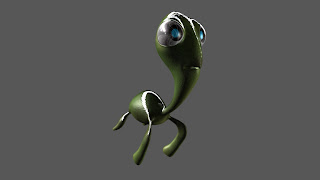This blog is more writing that image based as I had the lucky chance to work along side the Framestore commercials departments compositors and was with them as they were finish of their latest project. I have been taking notes all day and in this post will try put through all I have learnt about rendering and compositing!
First thing I was told about was the workflow and file setup for Nuke. At Framestore they use open.exr files that contain all the renderpasses etc in one file which when opening for composited you can get it all in one and break it down rather than importing individual layers and passes then making sure they all fit together etc.
I got good information on render layers and what they are used for:
Diffuse- Can be used for all lights in the scene but also can be broken down into different lights such as a key light (key light which would be you main source of light that would give all the reflections and shadows) and a fill light ( you use to fill in the unshaded areas which some light which is a technique used in live shooting, this is so you don't have one side of the face lit and the other dark so fill light would just even up things) in nuke you would use a Add node to blend them together.
Specular - which is a generally used render pass.
Reflection and Refraction
Indirect- Which was the main thing I learnt during the day that was this indirect lighting so its general sun light that just illuminates everything, such as outside where it can be lit without any rays of light. You can do this by using IBR which I have played with alot today but not allowed to show the frames I played with but below is a quick one I made just for this post to show the difference in quality.
The image at the bottom shows all the render layers That I have been listing and how they can bring an image to light and give it so much more and the awesome reflection I am getting is the Hdr image in the IBR, ok I have tweeked it at all so the image isnt well balance but I wanted to show the difference when render is well thought out and how much of a difference it can make!
Ambient Occlusion!- also known as the dirty layer
Shadows!
Will be talking to them again during the week so will be posting again with more notes from rest of today and the next time!


No comments:
Post a Comment